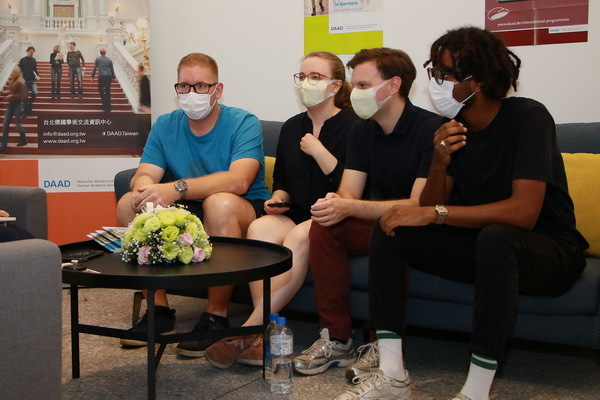German exchange students share their experiences with living in Taiwan during the pandemic

The exchange students talked about their life in Taiwan.
May 2020 marks the 1-year anniversary of the Technische Universität Darmstadt (TUDa) Asia Office at National Cheng Kung University (NCKU). TUDa and NCKU have had a cooperative relationship for 30 years. Together, the two universities have put effort into joint research programs and have built student exchange programs. This semester, TUDa chose to send over five students to NCKU as part of an exchange program. On May 8th during the students’ poster presentations, the exchange students from TUDa shared some of their experiences and thoughts with us.
In the face of the COVID-19 pandemic, the TUDa students find themselves in a situation that was not anticipated in their exchange plans.
“When I was leaving for Taiwan, my family was worried about me coming to Asia. But now, two months later, I’m more worried about them in Europe than they are about me.” Mr. Marc Henneberger, an exchange student to NCKU’s Mechanical Engineering Department, commented. In February when exchange students were set to arrive in Taiwan, the world was just beginning to recognize the severity of the COVID outbreak. Asia, with China being the epicenter of the disease, suffered the earliest wave of COVID-19 before its rapid spread began in Europe and America.
Mr. Caleb Mehari was originally heading for Shanghai, China, for an exchange program in architecture. However, due to the virus, TUDa had to make adjustments to ensure student safety. Mr. Mehari was redirected to NCKU in Tainan, Taiwan. “I didn’t know what to expect,” he said regarding the new arrangement.
Despite his initial unfamiliarity with Taiwan and uncertainty about Taiwan’s health situation, Mr. Mehari observed upon arrival that life continued as normal in Taiwan. He mentioned that schools in Germany at the time had either closed or put their classes online for remote teaching. “But here in Taiwan, schools are still open. Students can go to class, and people can still go out to eat.” He talked about how Taiwan did not go on lockdown. At the time of the interview on May 8th, Taiwan had reported no new local cases for 25 consecutive days. “Life continues here.”
Ms. Elvira Khamenok remarked when asked about life in Taiwan during the pandemic that Taiwanese people appear to be dealing with the pandemic in a calm, organized way. As was the case with Mr. Henneberger, her expertise is in the field of mechanical engineering. “The public is not panicking over the pandemic, and people have remained friendly even during this critical time,” she said. “People did not treat me differently because I’m a foreigner.”
Mr. Henneberger shared a story where he received help from passers-by when he was purchasing face masks. The mask-rationing plan was implemented on February 6th, after which all mask purchases had to be made with a National Health Insurance (NHI) card. For foreigners without an NHI card, a Resident Certificate is required during purchase. Mr. Henneberger realized he did not have the necessary credentials while waiting in line for the masks and decided to leave the pharmacy, but the staff and other passers-by asked him to stay and proceeded to call up the school’s personnel to help him access the required information. He was touched by the friendliness and helpfulness shown to him by the Taiwanese people.
Collectively, the TUDa exchange students agreed that life in Taiwan is convenient. It does not take too much effort to get around the city with different transportation methods, and it is easy to find food, especially near the NCKU campus. In spite of the pandemic, their exchange study period in Taiwan is a positive experience. (Writing by Hsu Tsu-yueh)